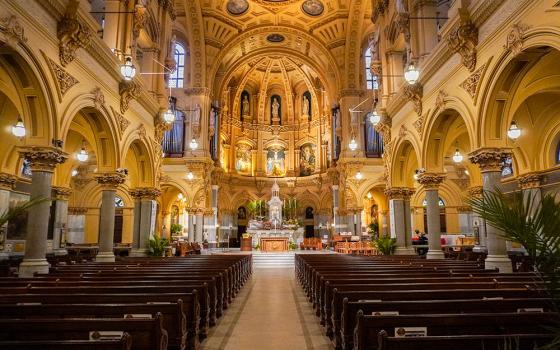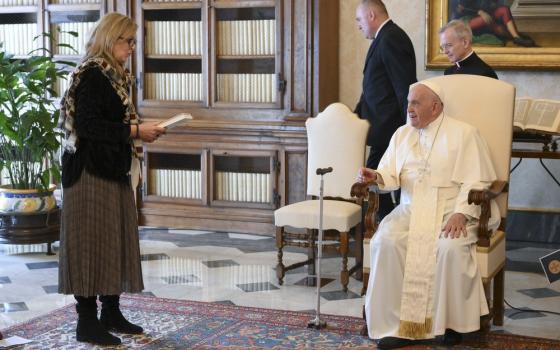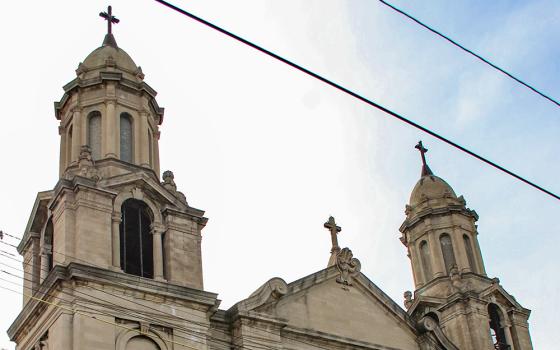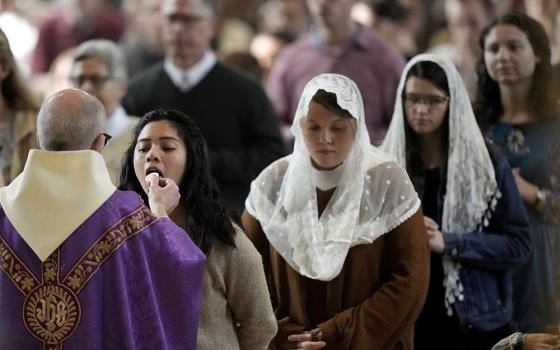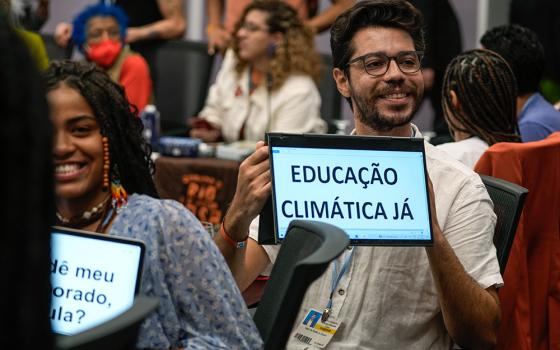Cardinal Pietro Parolin, Vatican secretary of state, is seen in this screen grab reading Pope Francis' speech for the inauguration of the Faith Pavilion at COP28, the U.N. Climate Change Conference, in Dubai, United Arab Emirates, Dec. 3. (CNS screen grab/YouTube/COP28 UAE Official)
To proclaim that the world is struggling is to utter the mundane. Regardless of the crisis — rising authoritarianism, armed conflict, migration, climate change or the specter of a future governed by bots, not people — we should all be concerned.
The Holy See seems to agree. Pope Francis has issued an impressive array of writings urging us to awaken to the calamities of our collective behavior. Most famously, his encyclical Laudato Si' and subsequent apostolic exhortation Laudate Deum weave together the challenges of climate change, economic inequality and social injustice. More recently, Francis has expressed caution over artificial intelligence, calling for an international treaty to govern its use.
The Vatican's moral proclamations on today's global turbulence are welcome and much needed. But frankly, we need something more tangible than inspirational words flowing from the pope's pen. We need action, the kind of action only the Holy See can deliver, the kind that turns prophetic proclamations into principled action. Pious thoughts and platitudes go only so far. Today's crises, especially climate change and AI, are driven by forces not easily moved by clerical finger wagging.
The world yearns for moral and political leadership. Francis is positioned to provide it. An example of such leadership was the Holy See's accession to the United Nations Framework Convention on Climate Change, or UNFCCC, in 2022. By becoming an official party to the convention, the Vatican intended to begin "a new dialogue about how we are shaping the future of our planet." Unfortunately, the Holy See failed to follow through and accept the responsibilities of a convention member, and instead reverted to its historical role as "observer."
Nevertheless, the Holy See's status as a party to the UNFCCC, equal in power to that of China, the U.S. and the European Union, offers an example of the kind of activism that the church can take in global affairs, while remaining true to its fundamental mission. Let me explain the Vatican's potential within the UNFCCC and how that potential can be fulfilled.
Pious thoughts and platitudes go only so far. Today's crises, especially climate change and AI, are driven by forces not easily moved by clerical finger wagging.
The UNFCCC is at heart a political body that is adversarial by design, pitting countries against one another in an ongoing ideological and geopolitical scrum. The divisive nature of the proceedings thwarts any consensus more aspirational than creeping minimalism. Its annual rounds of negotiations driven by the monotonous cadence of accusatory demands and defensive rebuttals, cries out for a fresh voice expressing a restorative vision based not on yesterday's grievances but on tomorrow's promise.
The deficiencies of the UNFCCC are an invitation for the Holy See to bring its prophetic voice to the deliberations as an active party to the convention. The Holy See is singularly situated to shift the tone of UNFCCC proceedings to one emphasizing not short-term economic interests, but long-term common benefits.
The church, with its distinctive geographical, demographic and moral stature can address the structural and behavioral deficiencies of the convention and transcend today's paralysis by serving as a reconciling third force, between developed and developing countries. The latest Conference of Parties (COP) in Dubai reinforced the view that the negotiations need an honest broker not encumbered by territorial imperatives and ideological obligations but committed to the moral primacy of the challenge. The Holy See can act in two vital areas that will contribute to viable climate action, and thereby begin that "new dialogue about how we are shaping the future of our planet."
First, the Holy See should actively engage in the negotiations. Put simply, observers observe, parties negotiate. By stepping from the sidelines and inserting itself into selected negotiations with moral vigor and technical competency, the Holy See will learn delegations' needs and discover how divisions can be healed and common ground can be found. Being an active negotiator is a practical way to effect change and build the trust and credibility the church needs to serve as an honest broker.
Second, left to themselves, Paris Agreement pledges won't reduce greenhouse gas emissions, and targets won't protect the vulnerable. Convention parties know why they have signed the Paris Agreement, what they need is a better understanding of how to implement the agreement. Developing countries lack both sufficient examples of successful climate action and the technical expertise to implement policies and projects.
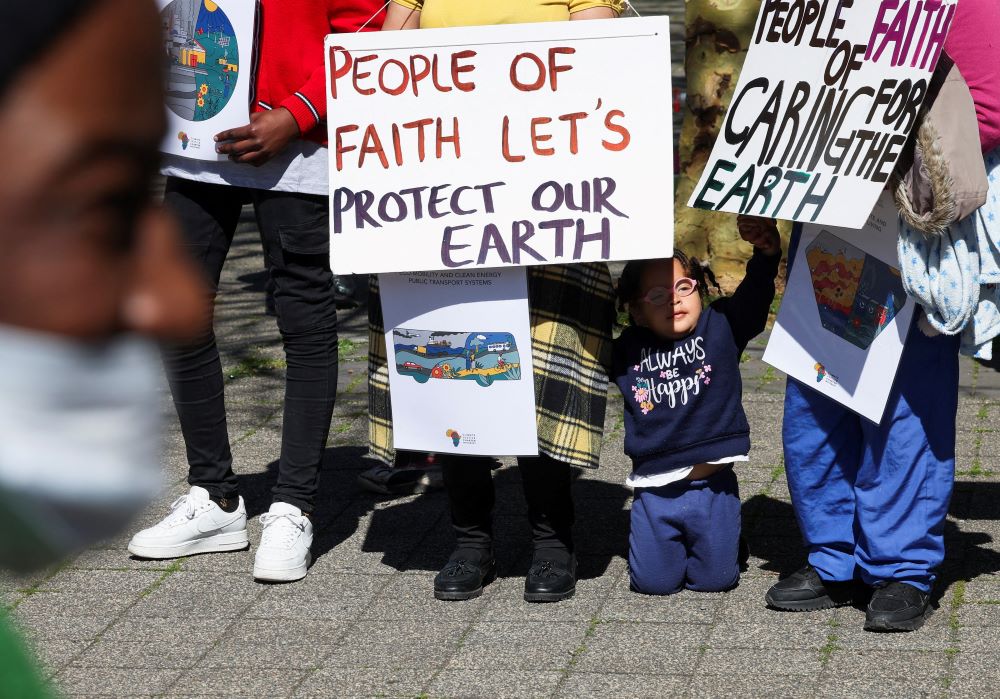
Climate activists in South Africa hold placards as they gather outside the Cape Town International Convention Center Sept. 13, during the Southern Africa Oil and Gas Conference to call for climate justice resistance against oil and gas corporations and an end to fossil fuels. Ahead of the COP 28 climate change conference, Catholic leaders in Africa called for decisive action aiming to save the continent. (OSV News/Reuters/Esa Alexander)
The Vatican can respond to this need with a two-tiered papal initiative based on the work of the Laudato Si' Action Platform and the competencies of Catholic universities. This two-tiered initiative combines the benefits of the church's network of practitioners' projects and programs that are flourishing around the world, with the expansive constellation of Catholic educators and students seeking to support climate solutions.
The church's vast network of practitioners can form the basis of a bold new virtual "Forum of What Works" (an "Agora for Equitable Action") sharing successful practices and connecting convention parties to on-the-ground climate solutions founded on justice and equity, solidarity and responsibility. Catholic dioceses and institutions throughout the world are serving as laboratories of experimentation and incubators of innovative climate action. This innovation needs to be shared more broadly through a more widely shared LSAP.
To augment LSAP good practices are the experts and scholars residing in Catholic universities all around the world. These institutes of higher education house what developing countries need: economic, scientific, financial, engineering and public policy expertise. This reservoir of talent can help developing countries plan, develop and implement a wide range of climate mitigation and adaptation policies and programs in fulfilling the Paris Agreement. A papal initiative that combines a compendium of practical solutions with the abundant supply of knowledge found in Catholic universities is a contribution unlike any other UNFCCC input to date.
These two reinforcing actions will establish the Holy See as an indispensable partner in the climate deliberations. The UNFCCC is at heart a political body, and climate solutions depend on political deliberations. As Francis states in Laudate Deum, existing institutions and modes of diplomacy need reformation: "The old diplomacy, also in crisis, continues to show its importance and necessity. Still, it has not succeeded in generating a model of multilateral diplomacy capable of responding to the new configuration of the world."
Advertisement
This proposed initiative addresses the Holy Father's exhortation for a new "model of multilateral diplomacy." The Holy See can infuse the UNFCCC with the spirit and objectives of Laudato Si' by linking its participation in the negotiations to the promotion of practical solutions, supported by Catholic university faculty and students.
The power of the Holy See can turn moral pieties and platitudes into climate projects and programs. A sociopolitical transformation of the kind called for in Laudato Si' won't happen through conventional thinking or accustomed ways of acting. Through active participation in the convention, the Holy See can reinvigorate seeds of hope and provide the spark and power for the "genuine conversion" that the Holy Father calls for.
As Francis asks others, so is he asking the church writ large, "To the powerful, I can only repeat this question: 'What would induce anyone, at this stage, to hold on to power, only to be remembered for their inability to take action when it was urgent and necessary to do so?'"





